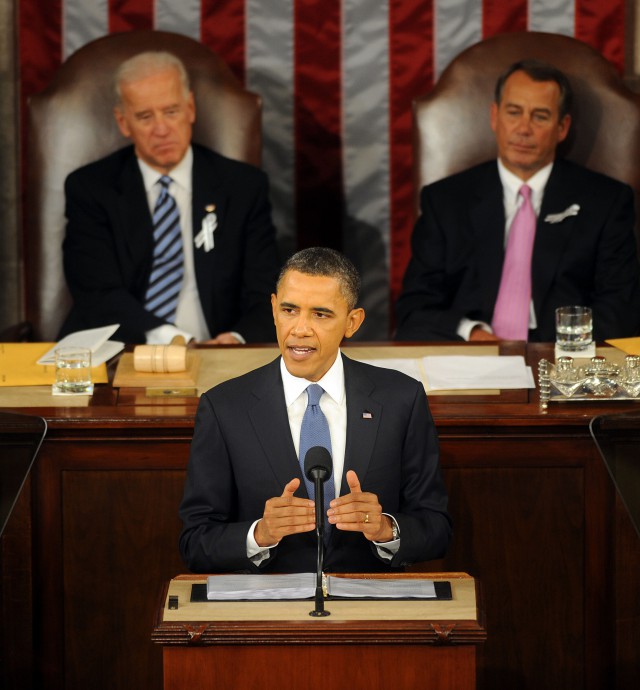
speech, suggesting new spending cuts while advocating increased outlays
for education, mass transit and infrastructure.
Obama’s hour-long address Tuesday night sought to
repel anticipated Republican efforts to roll back his party’s signature
legislative achievements, including the health care overhaul, during
the next two years.
He emphasized the need for bipartisanship, calling
on Democrats and Republicans to work together to create new jobs. “We
will move forward together, or not at all — for the challenges we face
are bigger than party, and bigger than politics,” Obama said.
Obama called for a five-year freeze on nonmilitary
discretionary spending in a bid to help reduce the deficit and said he
would veto any bill containing pet projects known as “earmarks.” He
also endorsed
But he defended his record thus far and warned that
while he may agree to tweaks to his legislative record, his top
priority in the next two years will be to preserve that work.
Especially on his landmark health care law, he called for changes where
needed, but warned he would oppose repeal.
“Instead of refighting the battles of the last two years, let’s fix what needs fixing and move forward,” he said.
Instead of the fractious reception he received in
his previous State of the Union speech, Obama encountered a more somber
welcome in which most lawmakers wore black and white ribbons in honor
of Rep.
Nonetheless, to Republican critics, his call for
government investment sounded like another spending package at a time
when deep cuts are needed. “That’s the real secret to job creation, not
borrowing and spending more money in
Rather than promising a near-term solution to
chronic unemployment, Obama devoted much of the speech to the threat of
competition for jobs from overseas, urging programs to “out-innovate,
out-educate and out-build” the rest of the world.
Obama outlined an agenda for the second half of his
term in office that tracks closely with his re-election strategy, in
which he is staking out a middle ground politically.
With several promises, Obama sought to address
perceptions that he spent too freely during his first two years in
power and is unconcerned by a budget deficit that now stands at more
than
federal spending not devoted to national security, which aides said
would reduce the deficit by more than
Obama said he would be reasonable in any negotiations. Waste and inefficiencies are rampant in government, he said.
But he warned that, as with the health care law, certain steps were off-limits.
Obama signaled that he would protect his signature
education program, called “Race to the Top,” which offers grant money
to schools that make strides in educating students.
He drew a protective barrier around the basic social
safety net, cautioning that he would not slash spending at the expense
of “our most vulnerable citizens.”
He added: “Cutting the deficit by gutting our
investments in innovation and education is like lightening an
overloaded airplane by removing its engine.”
That message is rooted in a hard-eyed calculation by
In some ways, the speech was in keeping with Obama’s
move to the center following the Democrats’ midterm election losses. He
called for reducing the corporate tax rate, freezing nondefense
discretionary spending and approval of free trade agreements that might
expand U.S. exports.
Obama showed a willingness to buck members of his
party. He said he would veto any bill carrying an “earmark” — a special
spending project that lawmakers pass with little scrutiny or
discussion. That stand sets up a potential showdown with one of Obama’s
closest allies, Senate Majority Leader
Equally revealing was what Obama did not say. He said very little new or different about the war in
the effort to halt the Iranian nuclear programs or other foreign policy
hot spots. As he has before, he claimed U.S. troops were making
progress at stabilizing
He made no mention of climate change legislation,
which business interests oppose and which stands little chance of
passing in any case. Since his midterm election setback, Obama has
tried to repair his relationship with the corporate world.
Obama also sought to reassure members of his liberal
base, who’ve bristled over some of his post-midterm moves. He said he
was committed to overhauling the nation’s immigration laws and finding
a pathway to legal status for the millions of people living in the U.S.
illegally. The odds of that happening are low, as Obama essentially
conceded.
Obama repeated arguments he has made before that
Americans must respond to the competitive threat from foreign workers.
In this case, it was part of his argument that the government should
spend money to help Americans compete globally.
“The president’s focus on innovation and
competitiveness is calculated to appeal to both parties as a path to
reversing American economic decline,” said
have the foresight to make needed investments in areas like
breakthrough energy technologies, even as they cut the overall budget.”
The president noted that the nation had created more
than a million private-sector jobs in the last year, but that still
leaves the economy with more than 7 million fewer jobs than before the
recession. Most experts believe it will take several years to recoup
those lost jobs and to bring the nation’s unemployment rate, currently
9.4 percent, to more normal levels of around 5 percent.
spending reductions as inadequate, even though their own party is
divided over budget cuts.
“That’s probably not going to inspire a lot of
people who want to see meaningful efforts to reduce spending and reduce
the debt,” said Sen.
Sen.
“That word ‘investments’ sure does sound good,” he
said. “But it’s really just a fancy way of saying ‘increase government
spending.’ “
———
(c) 2011, Tribune Co.
Distributed by McClatchy-Tribune Information Services.














